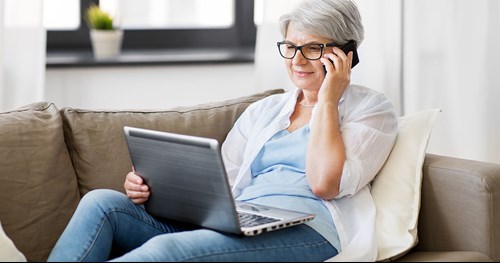While it’s vital that Americans hunker down at home to avoid spreading COVID-19, doing so may amplify another public health threat: loneliness. Research has shown that loneliness is as damaging to a person’s health as smoking 15 cigarettes per day.
Indeed, social isolation and loneliness can have a detrimental impact on the health and quality of life in adults aged 50 and older, particularly among low-income and underserved populations, according to a new report from The National Academies of Sciences, Engineering, and Medicine (NASEM). Those without access to the internet will be especially vulnerable. Researchers found social isolation was associated with a 50 percent increased risk of developing dementia, a 29 percent increased risk of heart disease and a 32 percent increased risk of stroke. Social isolation was also linked to depression, anxiety, and suicidal ideation.
It’s unclear how long we will need to stay physically apart to combat COVID-19, but when loneliness persists for a long period of time, it creates a chronic stress state and has a significant impact on a person’s health, says Vivek Murthy, physician and former surgeon general of the United States, in a recent interview with WBUR.
Murthy told the publication that so far there hasn’t been much attention to the long-term impact of social distancing. But many may experience physical and emotional problems the more they become isolated from one another.
Cynthia Boyd, a geriatrics specialist at Johns Hopkins University, who contributed to the National Academies of Sciences report, tells Vox that it’s important people remain connected during this period of social distancing and quarantine. “We need to be thinking about what individuals can do, but also what we as neighbors and a society can do, to not make it worse than it might otherwise feel for people,” she says.

There are steps people can take to remain emotionally and socially connected with other people during this period of isolation. For example:
Murthy suggests people take at least 15 minutes each day talking to or writing to someone you love. The consistency of doing it each day can help you feel more connected to others. Video conferences and phone calls have a bigger impact than just texting and emailing, Murthy tells Vox.
Physical exercise is also important, says Caitlin M. Rivers, an epidemiologist at Johns Hopkins, in a piece published by The Washington Post. While you may not be able to go to a gym, she suggests people go out for a walk or ride a bike.
Volunteer or reach out and help someone else, writes Amanda Ripley in the Washington Post article. This act of service provides a sense of purpose and helps reduce anxiety. Examples include running errands or getting groceries for an elderly neighbor.
